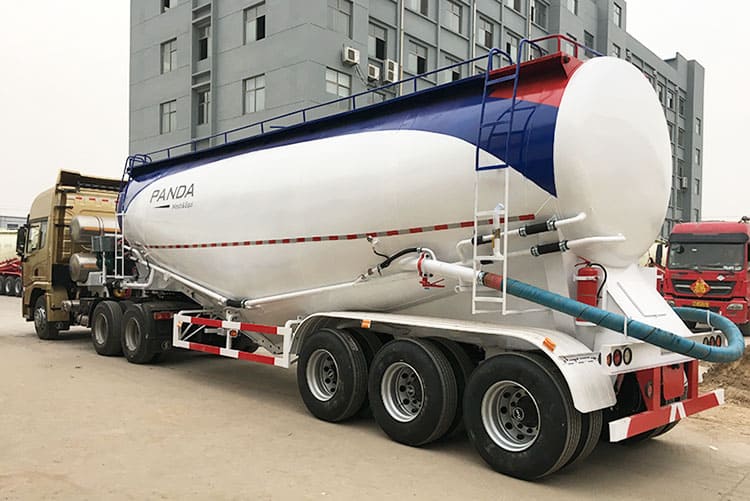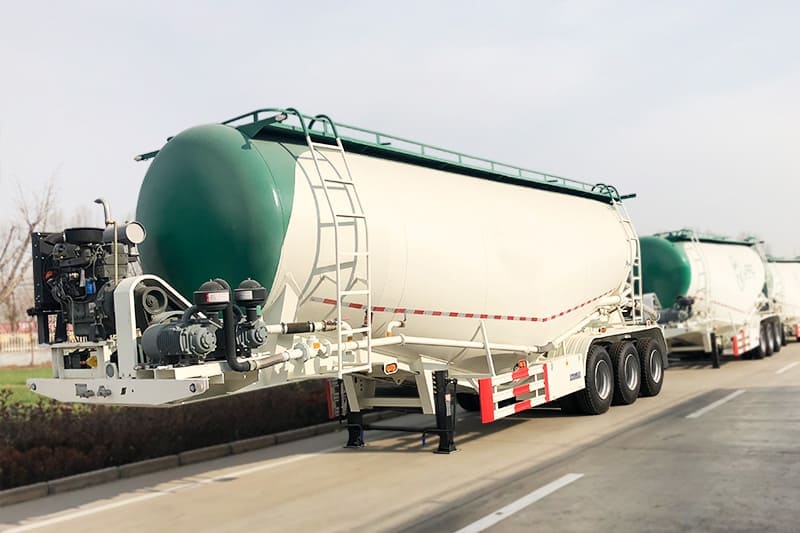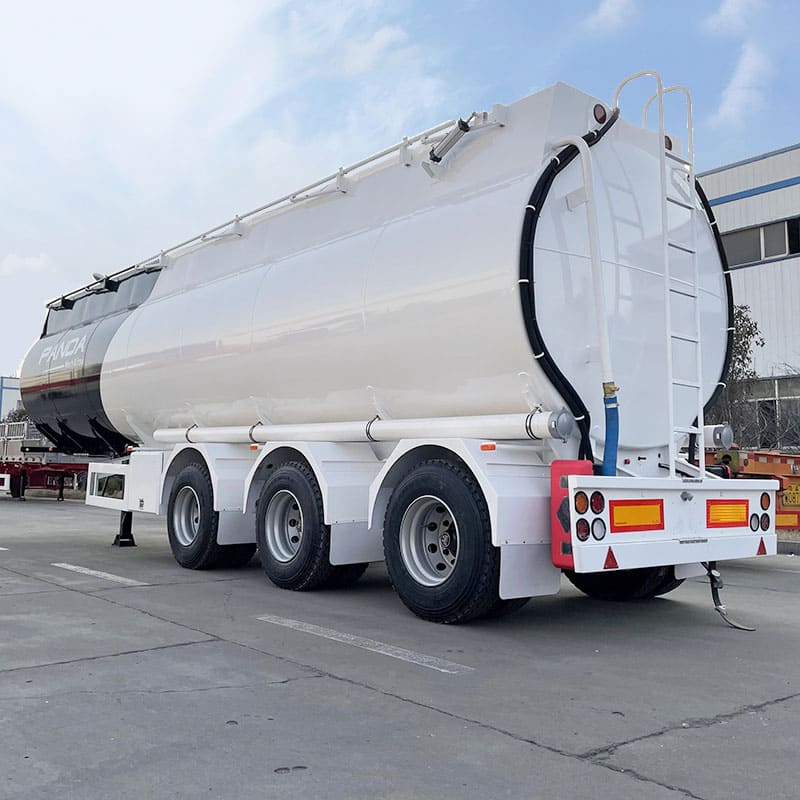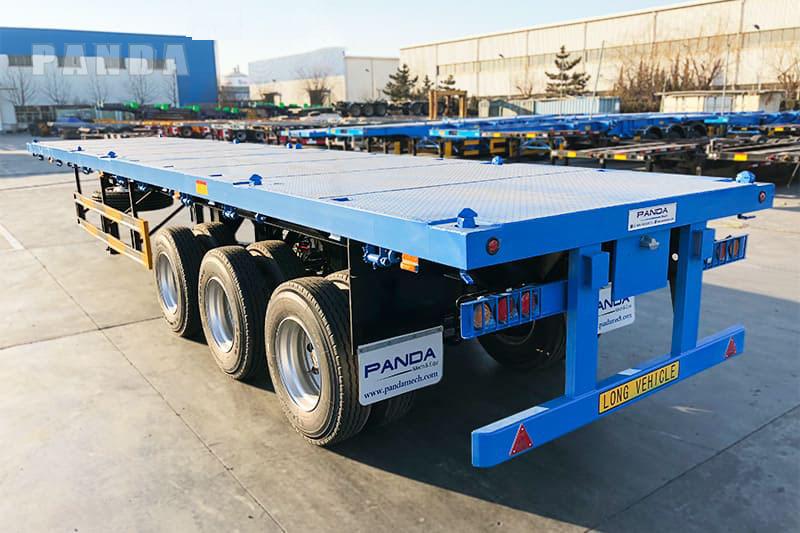هل تساءلت يوماً كم تكلفة المقطورة الهوائية? حسنًا، من المرجح أن يتراوح سعر المقطورات الهوائية الجديدة بين $15,000 و$38,000. يعتمد السعر على حجمها وخاماتها وميزاتها. بالنسبة لأولئك الذين يفكرون في الخيارات المستعملة، يمكنك توقع تكاليف تتراوح بين $8,000 إلى $20,000، وتتأثر بعمر المقطورة وحالتها وعلامتها التجارية. 🚛

ما هي تكلفة المقطورة الهوائية؟
استنادًا إلى خبرتي التي تزيد عن 20 عامًا في هذا المجال، كانت هناك أسعار مختلفة للقدرات والتكوينات والصهاريج الهوائية الجديدة والمستعملة لسنوات.
نطاق أسعار المقطورات الهوائية الجديدة
ستتراوح تكلفة المقطورات الهوائية الجديدة بين $15,000 و$38,000. يعتمد السعر على الحجم والمواد والميزات التي تختارها. المقطورات الأكبر حجماً ذات السعة الأعلى والميزات المتقدمة ستكون في الطرف الأعلى من النطاق. أما الموديلات الأصغر حجماً والأساسية فستكون تكلفتها أقل.
ينمو سوق المقطورات الهوائية بسرعة. تقود صناعات مثل البناء والزراعة الطلب على المقطورات الهوائية. 🚜
نطاق أسعار المقطورات الهوائية المستعملة
تتراوح تكلفة المقطورات الهوائية المستعملة ما بين $15,000 و$50,000. يعتمد السعر على عمر المقطورة وحالتها وعلامتها التجارية. المقطورات القديمة التي تعاني من البلى والتلف ستكون أقل تكلفة، بينما الموديلات الأحدث في حالة جيدة ستكون أغلى ثمناً.
يمكن أن يوفر لك شراء المستعملة المال، لكنك ستحتاج إلى فحص المقطورة بعناية. ابحث عن علامات الصدأ أو التلف أو الأجزاء البالية. أوصي دائماً بالتحقق من تاريخ الصيانة. فالمقطورة التي تتم صيانتها بشكل جيد ستدوم لفترة أطول وستتكلف أقل في التصليح.
إذا كنت تتساءل عما إذا كان شراء مقطورة مستعملة يستحق العناء، فكر في ميزانيتك وعدد المرات التي ستستخدم فيها المقطورة. بالنسبة للاستخدام العرضي، قد تكون المقطورة المستعملة هي الخيار الأذكى.
تكاليف استئجار المقطورات الهوائية
تتراوح تكلفة استئجار مقطورة تعمل بالهواء المضغوط بين $200 و$500 في الأسبوع. يعتمد السعر على حجم المقطورة وميزاتها والشركة المستأجرة. تعتبر الإيجارات قصيرة الأجل رائعة إذا كنت بحاجة إلى مقطورة لمشروع معين فقط.
وفي الوقت نفسه، تختلف الأسعار باختلاف المدن والبلدان والمناطق. ما أقدمه لك هو سعر مرجعي. يمكنك استشارة شركة التأجير المحلية للحصول على تفاصيل محددة.
لقد رأيت العديد من الشركات تستخدم المقطورات المستأجرة لاختبار نماذج المقطورات المختلفة قبل الشراء. عندما تعرفت على المقطورة الهوائية، قمت بشرائها مباشرة.
العوامل التي تؤثر على أسعار المقطورات الهوائية

عند التفكير في كم تبلغ تكلفة المقطورة الهوائية, ، العديد من الأشياء مهمة. دعونا نلقي نظرة على العوامل الرئيسية التي تغير الأسعار.
الحجم والسعة
يؤثر حجم المقطورة الهوائية وسعتها على سعرها كثيراً. المقطورات الأكبر حجماً تكلف أكثر لأنها تحمل كمية أكبر في الرحلة الواحدة. على سبيل المثال، تكلف المقطورة الهوائية سعة 40 متر مكعب أكثر من المقطورة سعة 20 متر مكعب. ولكن الأكبر ليست دائماً أفضل. إذا لم تكن بحاجة إلى مساحة إضافية، يمكن للمقطورة الأصغر حجماً أن توفر لك المال.
يرتبط ذلك بشكل أساسي بالبضائع التي تنقلها، مثل الجير أو الدقيق. يمكنك استشارة البائع للحصول على التفاصيل، وسؤال العديد من البائعين، والحصول على معلومات مختلفة، وتجنب التعرض للخداع.
جودة المواد والبناء
تغيّر المواد وجودة بناء المقطورة الهوائية من سعرها وقيمتها بمرور الوقت. المقطورات عالية الجودة تكلف أكثر في البداية ولكنها توفر المال لاحقاً. لماذا؟ لأنها تدوم لفترة أطول. إليك السبب في أن المواد الجيدة تستحق العناء:
- الأجزاء القوية تجعل المقطورات أكثر أماناً وتعمل بشكل أفضل.
- المواد المتينة تعني الحاجة إلى عدد أقل من عمليات الاستبدال.
- تقليل الأعطال وخفض تكاليف الإصلاح.
على سبيل المثال، المقطورات المصنوعة من الألومنيوم خفيفة ولا تصدأ، لكنها تكلف أكثر. أما المقطورات الفولاذية فهي أثقل وزناً وأرخص ثمناً.
العلامة التجارية والشركة المصنعة

تؤثر العلامة التجارية والشركة المصنعة للمقطورة الهوائية أيضاً على سعرها. تفرض العلامات التجارية الشهيرة أسعاراً أعلى لأنها موثوقة من حيث الجودة. ولكن يمكن أن تظل العلامات التجارية الأصغر حجماً خياراً جيداً. فبعضها يقدم صفقات رائعة.
على سبيل المثال، تُعد شركة Panda Mech واحدة من أفضل 3 موردين للمقطورات الهوائية في هذا المجال. وتتمتع المقطورات الصهريجية الهوائية التي تنتجها بسجل عدم وجود صيانة لمدة تصل إلى 4 سنوات.
غالباً ما تقدم العلامات التجارية الكبرى ضمانات ودعم أفضل، مما يساعد في حالة وجود مشكلة. قد يكون للعلامات التجارية الأحدث أسعار أقل لجذب المشترين. يتعلق الأمر بإيجاد المزيج الصحيح بين التكلفة والجودة.
الطلب والعرض في السوق
يؤثر الطلب والعرض في السوق بشكل كبير على أسعار المقطورات الهوائية. عندما يرتفع الطلب أو ينخفض العرض، ترتفع الأسعار. هذه قاعدة اقتصادية أساسية، ولكن دعني أوضحها ببساطة.
- نمو قطاع الإنشاءات: تحتاج المدن المتنامية إلى مقطورات لنقل المواد مثل الأسمنت.
- احتياجات الزراعة: يستخدم المزارعون هذه المقطورات لنقل الحبوب والمحاصيل.
- صناعة الطاقة: تقوم شركات النفط والغاز بنقل رمال فارك بهذه المقطورات.
عندما تنمو هذه الصناعات، فإنها تحتاج إلى المزيد من المقطورات. خلال الأوقات الاقتصادية الجيدة، غالباً ما تشتري الشركات مقطورات جديدة، مما يرفع الأسعار.
مشاكل التوريد 🏗️
يمكن أن تؤدي مشكلات العرض أيضًا إلى تغيير الأسعار. إليك ما يحدث:
- نقص المواد: انخفاض الألومنيوم أو الفولاذ يعني تصنيع عدد أقل من المقطورات.
- نقص العمال: يمكن أن يؤدي عدم وجود عدد كافٍ من العمال المهرة إلى إبطاء الإنتاج.
- التأخير في التجارة: يؤدي استيراد القطع في وقت متأخر إلى تقليل عدد المقطورات المتاحة.
عندما لا يكون هناك ما يكفي من المقطورات، ترتفع الأسعار. لهذا السبب أقترح مراقبة اتجاهات السوق قبل الشراء.
تغيرات الأسعار
إذن، كم تبلغ تكلفة المقطورة الهوائية عند تغير الطلب والعرض؟ يمكن أن تتغير الأسعار كثيراً. على سبيل المثال:
- عندما يكون الطلب مرتفعاً والعرض منخفضاً، قد تكلف المقطورات الجديدة $90,000.
- عندما يكون السوق مستقرًا، تكون الأسعار أقل والصفقات أفضل.
إذا كنت تشتري، فالتوقيت مهم. يمكن للمشترين توفير المال من خلال الشراء عندما يكون الطلب منخفضاً أو العرض مرتفعاً.
إذا قمت بشراء مقطورة تعمل بالهواء المضغوط في بلد آخر، فأنت بحاجة إلى شحنها إلى الميناء عن طريق البحر. وقد ارتفعت تكلفة الشحن البحري في السنوات الأخيرة، ويجب أيضاً تضمين هذه التكلفة في حساباتنا.
المقارنة بين المقطورات الهوائية الجديدة والمستعملة

مزايا شراء مقطورات جديدة
الحصول على مقطورة هوائية جديدة له العديد من الفوائد. أولاً، تأتي بأحدث الميزات والتقنيات. تستمر الشركات في تحسين التصميمات، مما يجعل المقطورات الجديدة أقوى وأكثر كفاءة. على سبيل المثال، قد تحتوي الموديلات الأحدث على أشكال أفضل لمقاومة أقل للرياح أو أدوات سلامة محسنة. يمكن لهذه التحديثات أن توفر لك المال مع مرور الوقت.
ميزة أخرى هي الاعتمادية. المقطورة الجديدة لم يتم استخدامها، لذلك لا يوجد أي تآكل أو مشاكل خفية. تتضمن معظم المقطورات الجديدة أيضاً ضمانات. إذا تعطل شيء ما، فستقوم الشركة بإصلاحه. وهذا يمنحك راحة البال، خاصة إذا كنت تدير عملاً تجارياً.
وأخيراً، شراء جديد يعني أنه يمكنك تخصيصه. يمكنك اختيار الحجم، والخامات، والميزات التي تناسب احتياجاتك. الأمر أشبه بتصميم المقطورة المثالية لعملك. إذا كنت تخطط لاستخدامها لسنوات، فإن هذا التخصيص مفيد جداً.
مزايا شراء المقطورات المستعملة
المقطورات المستعملة خيار ذكي إذا كنت ترغب في توفير المال. فهي أقل تكلفة مقدماً، مما يساعدك على توفير آلاف الدولارات. بالنسبة للشركات الجديدة، يمكن أن يكون ذلك مساعدة كبيرة. يمكن أن تذهب الأموال الموفرة إلى احتياجات أخرى، مثل توظيف العمال أو الإعلان.
ميزة أخرى هي أن المقطورات المستعملة غالباً ما تكون جاهزة للاستخدام. لا تحتاج إلى انتظار تصنيعها أو تسليمها. وهذا أمر رائع إذا كنت بحاجة إلى واحدة بسرعة لمهمة ما.
كما تفقد المقطورات المستعملة قيمتها بشكل أبطأ من المقطورات الجديدة. تنخفض قيمة المقطورات الجديدة بسرعة، لكن المقطورات المستعملة تحتفظ بقيمتها لفترة أطول. إذا قمت ببيعها لاحقاً، فقد تستعيد معظم ما دفعته. هذه طريقة ذكية لإدارة أموالك.
المخاطر المرتبطة بالمقطورات المستعملة
ينطوي شراء المقطورات المستعملة على بعض المخاطر التي يجب أن تعرفها. أكبر مصدر للقلق هو التلف الخفي. قد يكون في المقطورة المستعملة صدأ أو أجزاء مكسورة أو حوادث سابقة. قد يكلف إصلاح هذه المشاكل الكثير. لهذا السبب من المهم جداً التحقق من المقطورة وتاريخها.
السلامة مشكلة أخرى. تشير التقارير إلى أن الحمولات الثقيلة والمعدات القديمة يمكن أن تتسبب في وقوع حوادث. قد لا تحتوي المقطورات المستعملة على ميزات السلامة الحديثة أو قد تكون بها نقاط ضعف. يمكن أن تساعد الفحوصات المنتظمة والتدريب الجيد للسائقين، ولكن لا تزال المخاطر موجودة.
وأخيراً، لا تأتي المقطورات المستعملة غالباً بضمانات. إذا تعطل شيء ما، ستدفع تكاليف التصليح بنفسك. يمكن أن تتراكم هذه التكاليف، خاصة إذا لم يتم الاعتناء بالمقطورة بشكل صحيح. فكر في هذه المخاطر والمدخرات قبل أن تقرر ما إذا كانت المقطورة المستعملة مناسبة لك.
تكاليف إضافية يجب التفكير فيها عند شراء المقطورات الهوائية

عند شراء مقطورة هوائية، فإن السعر ليس كل ما ستدفعه. هناك تكاليف أخرى قد تفاجئك إذا لم تكن مستعداً. دعني أشرح لك هذه التكاليف ببساطة.
الصيانة والإصلاحات
الاعتناء بمقطورتك يكلفك المال مع مرور الوقت. هناك حاجة إلى الصيانة الدورية للحفاظ على عملها بشكل جيد. يمكن أن تزداد هذه التكاليف بسرعة. إليك ما يجب أن تخطط له:
- استبدال الأجزاء: تتآكل أشياء مثل الخراطيم والإطارات وخطوط الهواء.
- عمليات التفتيش المنتظمة: يساعد فحص المقطورة في كثير من الأحيان على اكتشاف المشاكل الصغيرة.
- إصلاحات غير متوقعة: في بعض الأحيان، تنكسر الأشياء فجأة وتحتاج إلى إصلاحات.
على سبيل المثال، يمكن أن يؤدي تخطي الفحوصات إلى مشاكل أكبر. يمكن أن تتحول مشكلة صغيرة، مثل خرطوم تالف، إلى إصلاح مكلف. المواظبة على الصيانة توفر المال لاحقاً.
تكاليف التأمين
التأمين هو تكلفة كبيرة أخرى يجب التفكير فيها. إذا كنت تستخدم المقطورة للعمل، فستحتاج إلى تأمين تجاري. وقد يكون ذلك باهظ الثمن. هناك أيضاً اختلافات كبيرة في أقساط التأمين في المناطق المختلفة.
كيفية اختيار الشركة المصنعة للمقطورات القلابة الجيدة

قد يبدو من الصعب العثور على أفضل مصنع للمقطورات القلابة. ركز على الجودة والاعتمادية والميزات التي تناسب احتياجاتك. إليك بعض النصائح البسيطة لإرشادك.
1. تحقق من وجود بناء قوي 🛠️
تستخدم الشركات المصنعة للمقطورات الهوائية الجيدة مواد قوية مثل الفولاذ أو الألومنيوم. تتحمل هذه المواد الأحمال الثقيلة بشكل جيد. تدوم المقطورة القوية لفترة أطول وتحتاج إلى إصلاحات أقل. انظر عن كثب إلى كيفية صنعها. هل هي قوية وموثوقة؟
2. فحص النظام الهيدروليكي ⚙️
النظام الهيدروليكي يجعل المقطورة تنقلب. إنه مهم جداً. تأكد من أنه يعمل بشكل جيد ويسهل إصلاحه. يمكن أن يتعطل النظام السيئ ويتسبب في حدوث تأخيرات.
3. اختر الحجم المناسب 🚛
تأتي المقطورات الهوائية بأحجام مختلفة. فكر فيما ستحمله. هل تحتاج إلى مقطورة كبيرة أم مقطورة أصغر؟ يساعدك اختيار الحجم المناسب على العمل بشكل أفضل وتجنب التحميل الزائد.
4. التركيز على السلامة 🛡️
السلامة مهمة جداً. ابحث عن المقطورات المزودة بمكابح قوية ومصابيح جيدة وأنظمة أمان. هذه الميزات تحمي السائق والحمولة.
5. العلامة التجارية
وغالباً ما تكون العلامة التجارية ضماناً للجودة، وغالباً ما تمثل العلامات التجارية المعروفة مقطورات هوائية عالية الجودة.
لا يقتصر اختيار الشركة المصنعة للمقطورات الصهريجية الهوائية المناسبة على التكلفة فقط. بل يتعلق الأمر بالعثور على الشركة التي تصنع المقطورات التي يمكنك الوثوق بها. اتبع هذه النصائح، وستقوم باختيار ذكي!
ستتكلف المقطورات الهوائية في عام 2025 من $30,000 إلى $90,000 للموديلات الجديدة و من $15,000 إلى $50,000 للمستعمل منها, على أساس الحجم والمواد والميزات. تتأثر الأسعار بطلب السوق ونمو التجارة الإلكترونية والتكنولوجيا الجديدة. يجب على المشترين مقارنة المقطورات الجديدة والمستعملة مع التخطيط لتكاليف الصيانة والتأمين والتمويل.
نصيحة احترافية: دراسة اتجاهات السوق والشراء في الوقت المناسب. أصبحت التصاميم خفيفة الوزن والصديقة للبيئة شائعة بسبب النمو الحضري واحتياجات الاستدامة. التخطيط الدقيق يمكن أن يساعدك على توفير المال! 🚛
الأسئلة الشائعة
1. فيما تُستخدم المقطورة الهوائية؟
مقطورة هوائية تنقل المواد السائبة الجافة. إنها رائعة لحمل أشياء مثل الأسمنت أو الحبوب أو الرمل. يساعد الهواء المضغوط على تفريغ الأغراض بسرعة وسهولة.
2. كم من الوقت تدوم المقطورة الهوائية؟
تدوم المقطورة الهوائية من 10 إلى 20 عاماً مع العناية الجيدة بها. إن الفحوصات المنتظمة، مثل فحص الخراطيم والإطارات، تحافظ على عملها لفترة أطول. كما أن استخدام مواد قوية يساعدها على الاستمرار.
3. هل يمكنني تخصيص مقطورة تعمل بالهواء المضغوط؟
نعم، يمكن تخصيص المقطورات الهوائية. تشمل التحسينات الشائعة تتبع نظام تحديد المواقع العالمي (GPS)، والطلاء المقاوم للصدأ، والإطارات الأفضل. هذه التغييرات تجعل المقطورة أكثر فائدة لعملك.
4. هل شراء مقطورة هوائية مستعملة محفوف بالمخاطر؟
الأمر محفوف بالمخاطر إذا لم تتحقق منه بعناية. قد تكلفك مشاكل مثل الصدأ أو التلف أو الأجزاء البالية لاحقاً. انظر دائماً إلى حالتها وتاريخ صيانتها قبل الشراء.
5. ما هي تكلفة صيانة المقطورة الهوائية؟
تتراوح تكاليف الصيانة من $1,000 إلى $5,000 كل عام. وهذا يشمل استبدال القطع، وعمليات الفحص المنتظمة، وإصلاح المشاكل المفاجئة. إن مواكبة الصيانة تجنبك مشاكل أكبر.
6. ما الفرق بين المقطورات المصنوعة من الألومنيوم والصلب؟
المقطورات المصنوعة من الألومنيوم خفيفة ولا تصدأ، بينما المقطورات المصنوعة من الفولاذ أثقل وزناً وأرخص ثمناً. يوفر الألومنيوم الوقود ويدوم لفترة أطول، لكن الفولاذ يعمل بشكل أفضل في المهام الصعبة.



